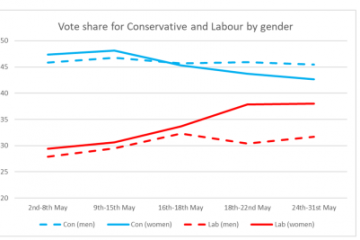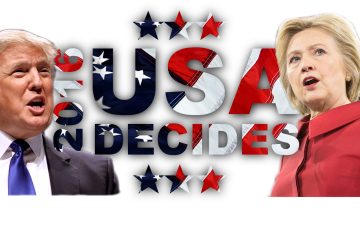OxPol Blogcast Episode 4: Mexico’s Midterm Election
Welcome to the OxPol Blogcast, a podcast where we will be sharing research, analysis, and experiences from members of the University of Oxford’s Department of Politics and International Relations. On each, episode we will talk to a guest about a piece they’ve written for the OxPol Blog. Then, we’ll discuss their larger research agenda, their insights on conducting political science, and their time at Oxford. On this episode of the OxPol BlogCast, host Chase Harrison talks to DPhil student Javier Pérez Sandoval about Mexico’s upcoming midterm election, theories of voter choices, and analysing democracy at the subnational level. Read the original blog post here: https://blog.politics.ox.ac.uk/a-return-to-the-right-for-mexico-foucaults-pendulum-and-missed-political-opportunities/ Views expressed on this podcasts are those of the guests alone and are not representative of …

Labour Poll Surge Thanks To Not Just Younger, But Also Older Women
Coverage of recent polls has suggested that women are becoming more supportive of Labour and that this is driving the recent tightening of the election race. The figure below shows the average vote intention separately for men and women on average using data from a range of different pollsters (see methodological note below). At the beginning of May there was very little gender gap. The Conservative lead was much the same for men as for women. For polls conducted in the past week, on average the Conservatives still had a large, 14-point lead amongst men, but only a small, 4-point lead amongst women. Compared with the start of May, women are now 7 points more likely to vote Labour than …

In Polls We Do Not Trust: The British Polling Experience
On 18th April 2017 Theresa May announced a snap general election to take place on 8th June. The announcement came as a surprise and was widely believed to be motivated by the large lead in the polls (approximately twenty points) that Ms May holds over her main rival, Labour Party leader Jeremy Corbyn. In calling the snap election at this point, Theresa May has put a lot of confidence in her projected lead in the polls. This is interesting because British election polls have previously been met with a large degree of skepticism and distrust. In this blogpost, I briefly explore the British polling experience and highlight the various explanations that have been provided for the UK’s poor track record …

What election analysts can learn from Trump’s win
Donald Trump’s presidential election victory has—among many others—upset political commentators. Few predicted the outcome. Most used periodic polling and historical trends to predict that Secretary of State Hillary Clinton would win. Almost every step of the way, from the primaries to election night, there were election analysts who failed to acknowledge Trump as a credible contender. Studies of the electoral map suggested the pathway to the White House was nearly unachievable for Trump. He would need to win all of the big swing states to reach the required 270 Electoral College votes. In the end Clinton won the popular vote but Trump received 290 Electoral College votes compared to Clinton’s 228 – a clear victory. Trump’s triumph has shocked a …

What to make of the US Election Forecasts
The majority of forecasts point to Hilary Clinton winning tomorrow’s US presidential election. Several of the poll, market and expert forecasts with probabilities for who will win are helpfully summarised by the New York Times here. The polls-based predictions are all, apart from one, pretty confident that Clinton will win. At the time of writing, Drew Linzer’s model at Daily Kos puts the probability of a Clinton win at 87%, HuffPost has 98% and Sam Wang at the Princeton Election Consortium estimate is as high as 99%. The New York Times’ own model is slightly less confident, on 84%. The exception is Nate Silver’s FiveThirtyEight model which puts Clinton’s chances at just 67%. The lower probability for Clinton in the FiveThirtyEight model …

Does the Republican Party actually know who votes for them?
You would think that the US presidential campaign teams would have a pretty good idea of what sort of person is likely to vote for them. A recent book suggest that the Democrats have developed highly complex ways of figuring this out. On the other hand, given two recent events, I’m not sure the Republicans have any idea.









